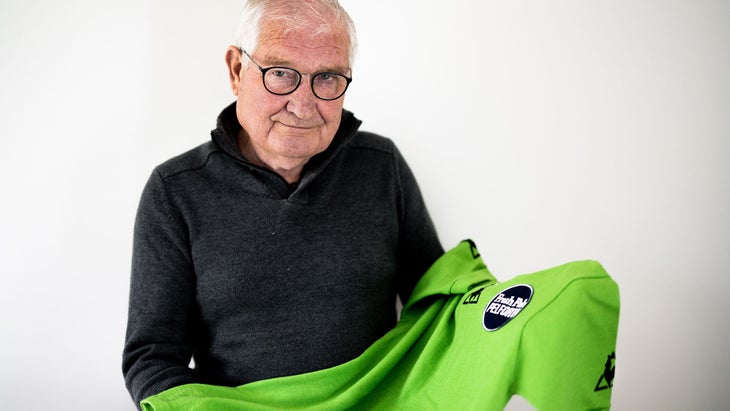When it comes to bicycle racing in Brittany there is the holy trinity of Bernard Hinault, Louison Bobet, and Jean Robic. And then there is Cyrille Guimard.
No, Guimard may not have won the Tour de France like the others, but he remains nothing less than a legendary figure in the sport. For while his own career was cut short by injury, he coached no fewer than three riders—Hinault, Laurent Fignon, and Lucien Van Impe—to no less than seven Tour de France victories, and played an instrumental role in the early career of a certain Greg LeMond.
Today Guimard lives in the village Guer in southern Brittany, not far from where he grew up and just a couple of hours up the road from Brest, where the Tour started this year as it celebrates the long cycling tradition in this part of the country.
“You know some people say that Brittany is not made for cycling because there are no flat roads and it rains a lot. But that is a cliché,” Guimard told VeloNews before packing for what will be his 50th Tour de France.
“Cycling has always been popular in Brittany for many reasons. First, there are no big cities here in Brittany. As a result, the bike was a major means of transportation for people in the farms and villages. My father who was a mason only got his first car in 1960. But he always went to work on his bike. And then the fact that there are no big cities means there are no big football teams, no big team sports. A bike race was always easy to organize and every village festival would have a bike race. They might have a horse race, a potato sack race too, but they had a lot of bike races. So it was only logical that we have had a long line of champions. When you have a lot of people riding, and they start young, well, it is normal.”
Guimard was one of those youngsters. Born in 1947, he grew up outside of Nantes after WWII, where he started cycling at the age of six. “I would ride in and out of the bomb craters still left over from the war. Heck, I was riding BMX, before it even existed.”
With a reputation as a punchy rider with an impressive turn of speed, Guimard quickly worked his way up the professional ranks. And after finishing seventh in the 1971 Tour, the Frenchman appeared primed to take on the legendary Eddy Merckx in the 1972 race, as he dominated much of the opening week, winning the first stage and wearing the yellow jersey for seven days. And he had a virtual lock on the green points jersey before he was forced to abandon on stage 18 due to a knee injury.

“Merckx actually came over and gave me the green jersey after the final podium ceremony,” Guimard remembers. “Even if he had won the final two stages he would not have gotten the green jersey from me, so he and race director Felix Levitan came over and gave me the jersey as the symbolic winner.”
Unfortunately, however, his ailing left knee only worsened and eventually brought a premature end to his career.
“In 1969 I had a bad accident. I was in a coma for three days and didn’t really come around for a good week,” Guimard said.
“I had heavy injuries to both my head and neck and the doctors were focused on that. And when I finally came around the swelling on my knee had gone down and I didn’t feel anything. It was only in 1975 when we did further studies that we learned there was really a fracture in my knee cap. But six years had transpired and the doctors were pessimistic that an operation would really help. And at this moment, Gitane offered me a job as a sports director and I instantly accepted. I had always been interested in coaching and even coached in cycling schools when I was still a rider. I was always something that fascinated me.”
Instantly successful behind the wheel of the team car, Guimard directed Belgian Lucien Van Impe to Tour de France victory in 1976 before directing Bernard Hinault to victories in 1978, 1979, 1981, and 1982, followed by Laurent Fignon in 1983 and 1984.
It was nothing less than a stellar string of victories that solidified his reputation as one of the sport’s all-time great directors. Furthermore, it was Guimard that first signed a certain Greg Lemond to a professional contract and it was under his tutelage that up-and-coming American won the rainbow stripes as world champion in 1983.
“If you are going to be a good director, or what is today essentially a manager, you have to be able to get inside the rider you are directing,” Guimard says. “A rider is a project, if you want to speak in modern jargon, and each project is different. It is the physical makeup but also the mental makeup, the personality that defines the kind of champion he will be. I never directed Bernard Hinault the same way I directed Greg LeMond or Laurent Fignon because, quite simply, they were very different riders and very different people.”
While Hinault was already on the Gitane team when Guimard took over, he takes particular pride in discovering LeMond.
“I’ll never forget, I went to see him race in the Tour of Brittany in 1980, and on the last day, he flatted while in the breakaway. Greg was furious and when the team car finally caught up to him he nearly punched the DS. He tried chasing for a while but eventually just threw his bike on the ground and dropped out. One person I was traveling with asked me if I was still interested in signing the kid, and I responded, ‘Now more than ever!’ To be honest I don’t know if I would have signed Greg otherwise. Hinault would have done exactly the same thing. It was simply the sign of a champion, somebody who really wants to win.”
After signing a preliminary contract with LeMond in Paris, he then went with Hinault to Nevada to sign the final contract and bring Greg back to France.
“It was important to see where Greg came from, what his life was like, what his family was like. Greg was only 19 or 20 years old and he was coming from a different world. It was important to see where he was coming from to better understand him. Again it was always important for me to be able to get inside each rider, to fully understand them.”
For the past 13 years, Guimard has worked as a commentator with the RMC radio. And he is clearly excited by the current crop of young riders on the scene today. “It is still hard to know how good Remco Evenepoel can be, especially after his crash last year. But he has enormous personality, that of a real champion.”
